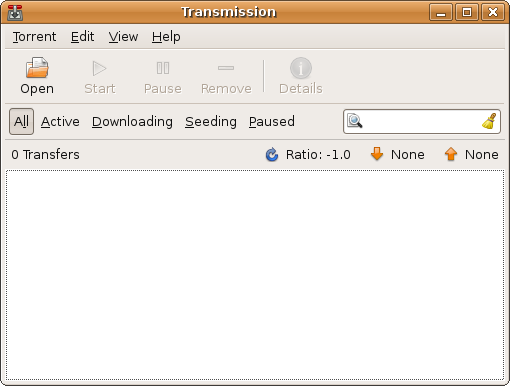Revisiting Linux Part 1: A Look at Ubuntu 8.04
by Ryan Smith on August 26, 2009 12:00 AM EST- Posted in
- Linux
Applications: Everything Else
Sometimes there is an advantage to not being a large, profit-generating target. If you are Microsoft or Apple, there are some things you just can’t take a risk on doing, the consequences of it backfiring are too great. In this case you would never see either of those operating systems include a BitTorrent client. While BitTorrent is legal, it can be used for many illegal things, making it an enemy of groups like the RIAA and MPAA – both of which Apple and Microsoft need to get along with for business reasons (imagine Windows without a DVD player) and because both have deep pockets should a fight erupt.
Canonical (the company backing Ubuntu) is not a large, profit-generating target and as a result they can get away with more here. We’ve already talked about legality issues encompassing codecs, but BitTorrent is another area where their size lets them get away with more. Ubuntu includes Transmission, a full-featured BitTorrent client, making it wholly unique (at least when compared to Windows/Mac OS X) for doing so. As a regular BitTorrent user, this is a most welcome type of application to include.
With there being so many BitTorrent clients I’m not going to get in-depth with features here other than to say that Transmission is a full-featured BitTorrent client. Instead the fact that it’s included at all is a big deal. Although it’s going to be a slight exaggeration, I would put the inclusion of a BitTorrent client up there with a web browser, an email client, or a media player. I consider BitTorrent an essential function, so a proper client is something that ideally would be included with every operating system. It’s that important.

There is one thing I’d like to add about Transmission in particular though. In my time using it, I’m not convinced that other BitTorrent clients are properly respecting it. I’ve noticed that some other clients appear to be ignoring or blocking it, and while it doesn’t appear to be opposed by a large number of clients, it’s enough that in my completely unscientific testing that this looks to make Transmission slightly slower compared to something like Azureus. Wikipedia notes that a version released over 2 years ago was commonly blocked for not being completely compliant with the BitTorrent specification, but I don’t know if this is related or not.
Moving on, there’s one other thing in Ubuntu that caught my eye, and that’s the inclusion of a Remote Desktop Protocol (RDP) client, going under the name of Terminal Services Client. Not to be confused with VNC, the open source remote desktop system commonly used on *nix systems, Remote Desktop Protocol is Microsoft’s proprietary remote desktop protocol and associated applications. While I had expected Ubuntu to include a VNC client, I had not been expecting a RDP client.
As I have a Windows Home Server for file storage and backing up my Windows machines, I need a RDP client to administrate it and the rest of my Windows machines. By “playing nice” and including a RDP client in spite of the fact that the protocol itself is proprietary and Ubuntu does not use RDP itself, this made Ubuntu much more useful for me straight out of the box. Among other things, with it I was able to immediately connect to my server and diagnose why I was having so much trouble connecting to my SMB shares, something which I’ll explain in greater detail in a moment.

Really the only downside to this is that it’s not as well built of a client as Microsoft’s own Windows client is, which is to be expected. Even on a gigabit LAN Terminal Services Client lags a bit compared to the real thing, but then again so does Microsoft’s official RDP client for the Mac. Ubuntu seems to be at a bit of a disadvantage here since it seems that Windows machines have an inherent advantage in being RDP clients. Nevertheless it’s fully usable, it’s just a bit slower.










195 Comments
View All Comments
ultraseksy - Tuesday, March 13, 2012 - link
i agree this is a brilliant site with lots of great content which i love thanks<a href="http://www.sendfreetext.info">send free text</a>
<a href="http://www.myplussizelingerie.co.uk">plus size lingerie</a>
<a href="http://www.uktrollbeads.co.uk">uk troll beads</a>
ultraseksy - Tuesday, March 13, 2012 - link
http://www.sendfreetext.info send free texthttp://www.myplussizelingerie.co.uk plus size lingerie
http://www.uktrollbeads.co.uk uk troll beads
juweliefol - Tuesday, April 24, 2012 - link
8.04 is a long LTS release, still there are lots of people are using.http://www.elegantpark.co.uk/wedding-dresses/a-lin...
xinxin - Friday, August 31, 2012 - link
If this article was a private work of the author to provide him an answer on whether he may or may not move to Linux, people should advise him the above mentioned. As for an article intended to be read by thousands it must be pointed out that it's conclusion is a miss lead.It is really nice.http://www.shortweddingdressus.com">http:/...http://www.shortweddingdressus.com
xinxin - Friday, August 31, 2012 - link
Nice website.I wish more works.http://www.shortweddingdressus.com